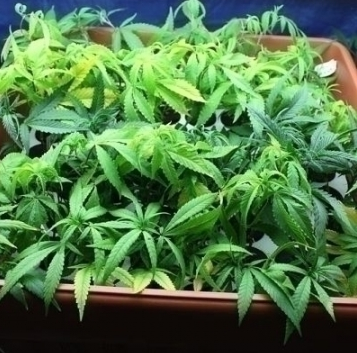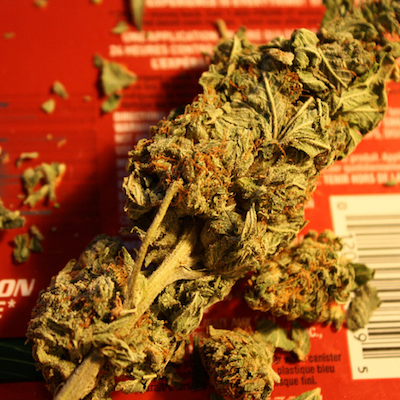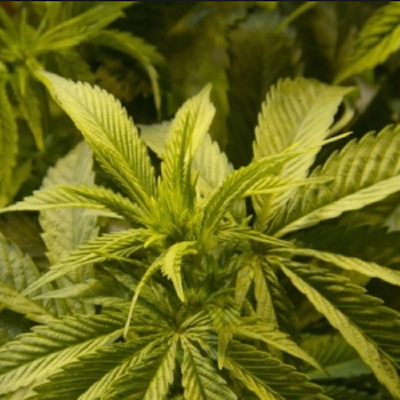Legalized, Taxed Marijuana Would Generate .1% of RI Budget
Friday, March 14, 2014
Based on the recent revenue reports from Colorado that showed them taking $2 million in taxes from the legalized sale of marijuana in January, if Rhode Island were to legalize and tax marijuana in a similar manner, the state could generate nearly $5 million annually -- which is less than .1% of Rhode Island's FY14 $8.3 billion budget.
The $2 million collected in Colorado in January stemmed from $14.2 million in sales, which would put the state on path to collect nearly $25 million from taxes alone in 2014, with fees collected putting that number at least $10M higher, as the combined tax-and-fee amount for January was $3.5 million.
See How New England Would Compare to Colorado BELOW
"I think that in general, the sales tax and excise tax in our bill are pretty close to what's going on in Colorado right now," said Rhode Island State Representative Edith Ajello, who is a sponsor of House Bill 7506, for the legalization and taxation of marijuana in the state. Ajello noted that in the Rhode Island legislation, "The excise -- which is when a wholesale sells to retailer, that's based on weight, $50 an ounce. The sales tax is 10%."
GET THE LATEST BREAKING NEWS HERE -- SIGN UP FOR GOLOCAL FREE DAILY EBLASTTo date, Ajello says a fiscal note has not been done on prior bill introductions, which she attributes to its introduction and referral to the Judiciary Committee. "Typically, the bill doesn't start in finance, it's in judiciary," said Ajello. "The logic behind that is that the legality issue, something that needs to be dealt with first."
Ajello is optimistic about the potential for legalization this year. "There are a significant number of my colleagues who are quite eager to see this move forward for a variety of reasons. Some of them are revenue, but another reason -- my primary reason -- is getting it out of the back alleys, when it's used by a significant amount of our population. The taxation would pay for the regulation, that's the first thing it does. A portion of the revenue would be set aside for public education, and addressing substance abuse treatment."
In contrast, Dr. Kevin Sabet with group Smart Approaches to Marijuana -- which is chaired by former Congressman Patrick Kennedy -- was vocal in his group's opposition to legalization -- and taxation.
"Taxing marijuana to fund the extra treatment and prevention required if we legalize the drug is like jumping in front of a car in order to get settlement money to pay for your hospital bills. Not only is it wrong headed, the money will never pay for the damages incurred," said Sabet. "And we see that with alcohol and tobacco today -- every $1 collected in revenue comes at a price of $10 in lost social costs."
Fiscal Implications for Legalization
Pat Oglesby, who is the Founder of the Center for New Revenue, commented on the tax and regulation scenario unfolding in Colorado -- and how other states are paying close attention.
"The numbers in Colorado came in a little light, lower than the estimates in which I was basing that $20 per resident per year revenue estimate," said Oglesby. "They've got a pretty low tax rate. There's so many moving pieces. You've got to keep it low enough."
Oglesby recently penned "Marijuana Taxes in Colorado - an Early Clue" for the Huffington Post, in which he wrote the one month sales were not necessarily an indicator of things to come. "In future months, Colorado's industry will probably sell more grams of marijuana than it sold in January, but at lower prices. More grams will pull taxes up. Lower prices will push taxes down. It's not clear where taxes will end up," wrote Oglesby.
"Over time, the legal price will go down. If I can rent space -- not sneak around like a bootlegger -- my cost is going to come down," Ogelsby told GoLocal. "The bootlegger is not going to benefit from the cost reduction. Costs are high for the start-ups - they've had to hire lawyers, get licenses. The weak will perish, the strong will survive."
"I'm just a tax guy -- I can't talk to marijuana use being influenced by price point," said Oglesby. "Colorado has a tax based percentage of of price. if price goes down, tax goes down. Contrast that with the Rhode Island legalization proposal, which is based on weight. So if the price goes down, the tax doesn't. I think that's a smarter approach."
Oglesby noted where he saw some issues with the Colorado model. "Whenever you have price as the basis for a tax, people start playing around on that. How do you tax a deal like, "$30 all-you-can smoke"? Or stay-and-smoke packages at hotels? It makes it very difficult. "
Mason Tvert with the Marijuana Policy Project thought that every state looking to legalize moving forward would have to deal with taxation issues on a state-by-state basis.
"Every state is going to decide for themselves how to treat marijuana, and what the appropriate tax structure should be, just like every state decides how to tax alcohol," said Tvert.
Tvert said he believed that legalization would curtail an underground market, "Ultimately, the black markets will be eliminated -- there will be no economic incentive for risk for growing, transportation, or selling it illegally," said Tvert.
He warned however that setting a tax rate too high. "If one of the goals is take it out of underground market, but states tax it a rate that allows still for a black market, you're failing to meet your goal. Colorado specifically capped excise cap at 15%, which was modeled after how alcohol was taxed after Prohibition, to allow the entry back into legal market."
Opposition, Opportunity
Sabet, issued the following statement along with Kennedy earlier this week regarding the recent numbers out of Colorado.
“It appears that Colorado is falling well short of the state's revenue projection from marijuana sales. Instead, the number from January is less than $2 million, far below estimates claimed by the Governor and legalization advocates. Of course, just like alcohol and tobacco revenue, we know that the sales of this intoxicant will bring in far less than the costs of its use. In fact, every $1 in alcohol and tobacco revenue the state gains comes at a price of $10 in lost social costs. Already, legalization in Colorado has been characterized by children visiting hospital emergency rooms for marijuana poisonings from ‘pot cookies,’ increased marijuana use in schools, and a 40% increase in workplace and school drug tests."
Tvert, however, saw the role of tax revenue as being beneficial, but by no means a solutions. "The regulation and taxation is not going to solve a state's economic problems, but it can help significant. Take Rhode Island -- it might not save its pension fund, but it could go towards programs and services for Rhode Islanders. You can't draw a lot of conclusions from the first month -- there was increased demand, and a lot of businesses still aren't open yet."
Related Slideshow: Potential Revenue From Legalized Pot in NE States
Using Colorado as an example, GoLocal analyzed how much potential revenue each New England state could make--and how impactful that would be to the state budgets--by following the same path.
In Colorado, recreational marijuana sales are taxed through a 12.9 percent sales tax alond with a 15 percent excise tax.
Related Articles
- New England States With The Highest Marijuana Arrest Rates
- Guest MINDSETTERS™: A Sensible Marijuana Policy for Rhode Island
- State Report: Marijuana Legalization Bill + Tax Hike Proposal
- New Gallup Poll Shows 38% of Americans Have Tried Marijuana
- In Case You Missed It: Highest Marijuana Prices in New England
- The Highest Marijuana Prices in New England by State
- PODCAST: Are Medical Marijuana Users in RI Risking Their Jobs?
- Jared Moffat: Now is the Right Time for RI to Regulate Marijuana
- The Impact of Marijuana Legalization on RI’s College Campuses
- PODCAST: The Highest Marijuana Prices in New England by State
- Legalized, Taxed Marijuana Would Generate .1% of RI Budget
- The Scoop - Whitehouse Talks State and Federal Marijuana Laws
- PODCAST: Will RI Be The Next State To Legalize Marijuana?
- Marijuana Use in the New England States
- Are Medical Marijuana Users in Rhode Island Risking Their Jobs?
- NEW: Marijuana Arrest Rates Racially Disparate Toward Blacks
- Will Rhode Island Be The Next State To Legalize Marijuana?
- Breaking and Entering Doc Holding Marijuana Suspended by RI HEALTH
- NEW: New England NAACP Calls for Marijuana Legalization in RI
- NEW: RI Legalization Bill Would Tax Marijuana Like Alcohol
- Do You Favor Legalized Marijuana and Taxation in Rhode Island?
- NEW: Patrick Kennedy in the Middle of Super Bowl Marijuana Fight
- NEW: RI to Introduce Marijuana Regulation + Taxation Bill








_400_400_90.jpg)





_80_80_90_c1.jpg)

